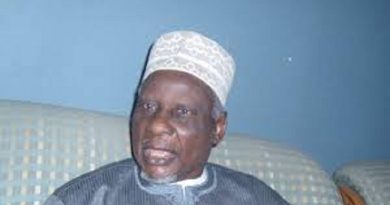Revealed: NAFDAC Disagrees With WHO On Chloroquine Clinical Trials
Notwithstanding the decision of the World Health Organisation (WHO) to suspend clinical trials of Hydroxychloroquine and Chloroquine for the treatment of COVID-19, the National Agency for Food and Drug Administration and Control (NAFDAC) will continue the experiment in Nigeria, the agency’s Director-General, Prof. Mojisola Adeyeye said.
She said yesterday on a Lagos-based private broadcast station, TVC, programme, that there were proven records that Hydroxychloroquine had been effective in the treatment of COVID-19 patients, especially those at the “mild stage” of the virus.
The virus infected 276 more Nigerians yesterday, bringing the total infections to 8,344 with 2,385 persons discharged and 249 deaths spread across 34 states and the Federal Capital Territory.
The Nigeria Centre for Disease Control (NCDC) reported last night that the new cases were reported from 15 states, including Lagos 161, Rivers 36, Edo 27, Kaduna 19, Nasarawa 10, Oyo six, Kano four, Delta three, and Ebonyi, three.
Gombe, Ogun, Ondo, Borno, Abia and Bauchi had one each.
However, as the pandemic continues to ravage the world, former President Goodluck Jonathan has asked African countries to look inward for remedies.
WHO on Monday announced the temporary suspension of the clinical trials of Hydroxychloroquine as a potential drug for the treatment of COVID-19.
It said the decision followed a study that using the drug on patients could increase their chance of dying.
“The Executive Group has implemented a temporary pause of the Hydroxychloroquine arm within the Solidarity Trial while the safety data is reviewed by the Data Safety Monitoring Board,” Director-General of WHO, Dr. Tedros Ghebreyesus, had said.
He stressed that Hydroxychloroquine and Chloroquine “are accepted as generally safe for use in patients with autoimmune diseases or malaria,” noting that the suspension was a temporary measure.
But Adeyeye disagreed with the WHO’s position, saying: “There is data to prove that Hydroxychloroquine worked for many COVID-19 patients. Therefore, we would continue our own clinical trials in Nigeria. Hydroxychloroquine has been proved to work at a mild stage.
“So the potency depends on the severity of the disease in the patient’s body.”
According to her, Lagos State has already begun Hydroxychloroquine clinical trials and depending on the speed of work, the clinical trials should be concluded within four months.
“If medical doctors, research scientists, pharmacists, herbal experts work together, we should conclude the clinical trial in three to four months. The narrative might change afterwards but for now, we believe in Hydroxychloroquine,” she stated.
Jonathan Urges Africa to Look Inward for Remedies
Former President Goodluck Jonathan has urged African countries to look inward for home-grown solutions.
Jonathan also stressed the need for the boosting of economic activities and co-operation in Africa, noting that increasing trade within the continent would significantly improve the economies of African nations.
He spoke during a teleconference organised by the Universal Peace Federation (UPF) to mark Africa Day 2020.
The conference, which is part of UPF’s peace talks webinar series, focused on the theme: “creating an interdependent and prosperous Africa in a world in conflict at the time of the COVID-19 crisis” had panellists drawn across different countries, especially from Africa.
Jonathan spoke alongside former Vice President of Zambia, Dr. Nevers Mumba; President of the National Assembly of Republic of Sa Tome and Principe, Mr. Delfim Santiago das Neves; former Minister of Family, School Affairs and Microfinance, Benin, Ms Marie -Laurence Sranon and Chairman of UPP International, Dr. Thomas Walsh.
Jonathan urged Africa to seize this challenge to look inward, adding that such efforts would produce home-grown solutions.
“Those who are managing the crisis must look at the circumstances of their nations. The issue of lockdown, for example, should be enforced in consideration of the peculiar circumstances of African nations,” he said.
FG Increases Testing Laboratories to 28
The federal government has added two new molecular laboratory centres to the country’s testing facilities, thus increasing the number from 26 to 28.
The Nigeria Centre for Disease Control (NCDC) tweeted yesterday that the laboratories include the Afriglobal Medicare Laboratory in Ogun State and the Sahel Centre for Molecular Diagnostics and Research in Katsina State.
It said: “This brings the total number of molecular laboratory network with COVID-19 testing capacity in Nigeria to 28.”
US Company Begins Clinical Trial of Vaccine
An American biotechnology company, Novavax, has commenced human trials of COVID-19 vaccine in Australia.
The firm said yesterday that it was hopeful that the vaccine could be available to the public by the end of the year.
The Research Chief, Dr. Gregory Glenn, said during a virtual press conference in Melbourne from Novavax’ Headquarters in Maryland, the United States that the firm had commenced the first phase of the trial in which 131 volunteers would be tested.
He added that the volunteers will be from Melbourne and Brisbane and the test would look for early signs of the vaccine’s effectiveness.
He said: “We are in parallel making doses, making vaccine in anticipation that we’ll be able to show it is working and be able to start deploying it by the end of this year.”
Many experimental vaccines are in early stages of testing or will begin testing across China, US, Europe. Vaccines are being created with different technologies and work in different ways, which give a possibility of at least one to succeed.
“Most of the ‘tested’ vaccines aim to train the immunity system so that it recognises the spike in the protein that studs the coronavirus’ outer surface, instructing the body to react if it ever encountered the real infection.
While other companies are making vaccines that are made using just the genetic code for that protein, and others use a harmless virus to deliver the protein-producing information.
“Still, other vaccine candidates are more old-fashioned, made with the killed whole virus,” he said.
According to him, Novavax has made another addition to the list of ‘types of vaccines’ as it has introduced the ‘recombinant vaccine.’
“In these vaccines, Novavax has used genetic engineering to grow harmless copies of the coronavirus spike protein in giant vats of insect cells in a laboratory. Scientists extracted and purified the protein, and packaged it into virus-sized nanoparticles,” he said.
Wuhan Conducts over 6.5m Tests in 10 days
The Chinese city of Wuhan, where the virus broke out in December 2019, has conducted 6.5 million COVID-19 tests in 10 days.
Wuhan reportedly embarked on a citywide nucleic acid testing drive, which came after six new cases emerged in a residential community earlier in the month.
The nucleic acid tests are said to function by detecting the virus genetic code, which then detects the infection, particularly in its early stages.
Health officials reportedly went into construction sites, markets and local communities to obtain swab test samples from more than nine million residents from May 15 to 24.
During the period, booths were set-up across the city’s neighbourhood with residents lining up for their samples to be taken.
On Friday alone, Wuhan reportedly conducted 1.47 million tests.
According to Worldometer, China has confirmed 83,000 cases of COVID-19 with over 78,000 recoveries and 4,000 deaths.




